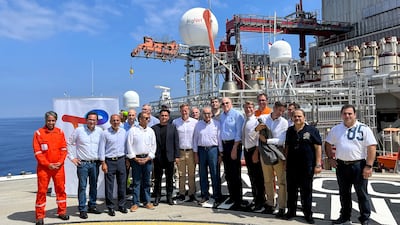Lebanon's long-awaited exploratory drilling for offshore oil and gas was set to begin on Thursday, 10 months after a landmark US-mediated agreement that demarcated its maritime border with Israel.
French oil giant TotalEnergies is leading the consortium drilling at an area called Block 9, along with Italian company ENI and state-owned QatarEnergy.
Lebanon's political leadership has pinned its hopes on potential hydrocarbon reserves as a source of foreign currency for the cash-strapped nation. Lebanon is grappling with unparalleled financial turmoil and its currency's value has plummeted by more than 98 per cent against the dollar since in 2019, pushing 80 per cent of the population into poverty.
“After 67 days, we will know the results of this drilling. We hope it will bring good things for the Lebanese,” caretaker Energy Minister Walid Fayad said in a statement published on Tuesday by the state-run National News Agency.
His statement followed a visit to the drilling rig that was moved into position about 120km off the Lebanese coast on August 16. Mr Fayad, Parliament Speaker Nabih Berri, caretaker Prime Minister Najib Mikati and caretaker Minister of Public Works Ali Hamieh were flown to the rig aboard a helicopter provided by TotalEnergies.
“This exploration well will allow us to assess the materiality of hydrocarbon resources and production potential in the area,” said Romain de La Martiniere, TotalEnergies’ general manager in Lebanon.
Mr Mikati said after a meeting with TotalEnergies senior officials on Tuesday that the start of drilling was a beacon of hope for the country “to provide additional resources for Lebanon to help rise from the current crises”.
“Everyone should set personal interests and considerations aside and handle the project as an achievement that serves all the Lebanese alike, especially in its capacity as a fundamental pillar for the advancement of the national economy,” he added.
Meanwhile, on Thursday, it was announced that a 3D survey of an offshore area known as Block 8, which neighbours Block 9 to the west, would commence soon.
British firm Geoex MCG and Egyptian company Brightskies Geoscience will undertake the operation under the authority of the energy ministry, in an area of around 1,400 square kilometres.
“The geophysical survey is designed to leverage newfound optimism in the country’s hydrocarbon potential” in the wake of the activities in Block 9, Geoex said.
The survey will start this year, with results expected in the first quarter of 2024.
Lebanon's maritime border agreement with Israel, with which it is still technically at war, followed a decade of US-led efforts to settle a dispute over the potentially abundant oil and gas reserves claimed by both countries.
It was an unprecedented understanding between two enemy states, amid negotiations that at one point risked spilling over into conflict.
Hezbollah, the powerful Lebanese armed group that is particularly strong in southern Lebanon, has repeatedly engaged in conflict with arch enemy Israel.
Last summer it launched three unarmed drones towards the Karish gasfield, which was also at the time claimed by both Lebanon and Israel.

